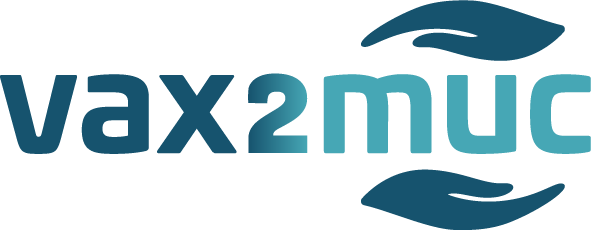
Game-changing research collaboration starts: Vax2Muc will pave the way for next-generation vaccines against gastrointestinal mucosal pathogens
Munich, Germany - August 25th, 2023
The constant rise in antimicrobial resistance (AMR) has a major impact on global public health, urgently requiring novel strategies to prevent and treat bacterial infections. The development of effective vaccines represents an attractive cost-effective alternative to novel antibiotics and would be a game changer for patients. For many bacterial infections, especially those occurring on mucosal sites, no effective vaccines exist. Helicobacter pylori (H. pylori), a pathogen residing in the stomach, is the cause of the most common chronic bacterial infection, affecting half of the world´s population, with a high risk to progress into gastric cancer. Therefore, among other gastrointestinal (GI) pathogens, H. pylori was declared as priority neglected AMR target pathogen by the WHO, requiring rapid intervention to counter AMR. Standard-of-care for H. pylori is still an antibiotic therapy combined with a proton pump inhibitor, and thus effective treatment of H. pylori infection is severely hampered by rising AMR.
Against this backdrop, the Technical University of Munich (TUM) announced today the launch of Vax2Muc (“Next generation vaccines against gastrointestinal mucosal pathogens, using Helicobacter pylori as a model pathogen”), an international and interdisciplinary research collaboration that sets out to develop improved, innovative, next generation subunit vaccines effective against diseases caused by AMR mucosal pathogens colonising the GI tract.
Over the next 5 years, the project will receive more than 8.4 million Euro funding from the European Union’s research programme Horizon Europe.
The international research team led by Prof Markus Gerhard will develop, as a proof-of-concept, a prophylactic H. pylori vaccine candidate that will be evaluated in a phase I clinical trial. Moreover, it will advance GMP manufacturing, investigate and progress novel vaccine technologies and strategies for optimised mucosal immunity in the GI tract.
TUM’s Professor Markus Gerhard, coordinator of the Vax2Muc project, explains the importance of the project: “Mucosal infection, especially those occurring in the gastrointestinal tract, are difficult to prevent through vaccination. Only very few vaccines exist, and these often have low efficacy, or do not lead to complete (sterilizing) protection. This problem is tackled by our consortium, which will develop novel vaccination.”
Dr. Verena Friedrich, scientific project manager at TUM, said: “We are delighted to collaborate with such renowned international and interdisciplinary partners for this exciting, and ambitious initiative. For many years now, we have been investigating H. pylori infections, associated gastric cancer, and the development of vaccines against this mucosal pathogen, and will contribute our expertise on H. pylori immunology and vaccinology in this research project.
The Vax2Muc consortium includes world-leading institutions that are perfectly placed to evaluate such new technologies with the potential to close existing gaps in the prevention of bacterial infections. The consortium includes experts from (in alphabetical order): Faculdade De Farmácia Da Universidade De Lisboa, Helmholtz Centre For Infection Research, InStar Technologies a.s., IRTA Institute of Agrifood Research and Technology, Statens Serum Institut, Trinity College Dublin, Universiteit Antwerpen, University of Strathclyde.
What is Horizon Europe?
Horizon Europe is the EU’s key funding programme for research and innovation with a budget of €95.5 billion. The programme facilitates collaboration and strengthens the impact of research and innovation in developing, supporting and implementing EU policies while tackling global challenges. It supports creating and better dispersing of excellent knowledge and technologies. Find out more.

Disclaimer: Views and opinions expressed are however those of the author(s) only and do not necessarily reflect those of the European Union or European Health and Digital Executive Agency. Neither the European Union nor the granting authority can be held responsible for them.